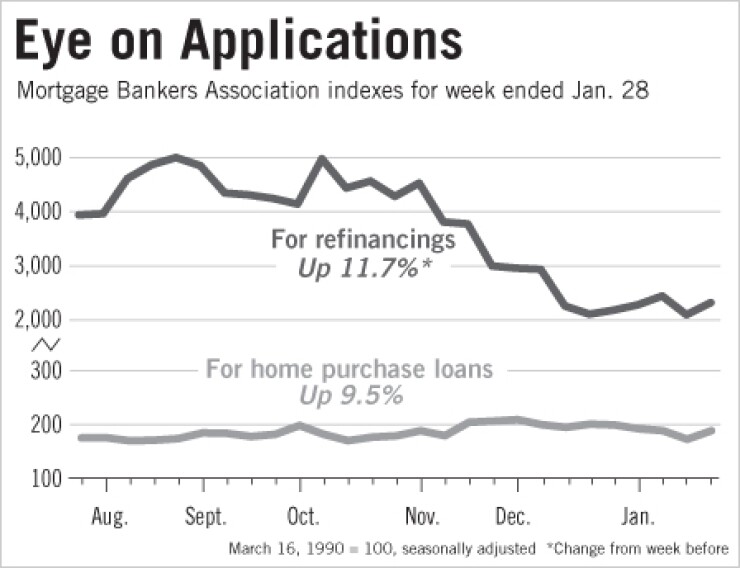
Sobering Scene
One morning last month, John Cunjie sat at a small round table in the middle of a vast hotel ballroom shuffling papers in a manila folder.
He had braved the snow to reach the New York Marriott Hotel in Brooklyn, hoping to get a loan modification from Wells Fargo & Co., which was putting on a two-day workshop there. About 75 people had showed up that morning, in addition to the 200 Wells staff members. Free popcorn and lemonade, and televisions playing music videos, gave the event the atmosphere of a bleak carnival.
Nearly five years ago, Cunjie bought his home in Nassau County, N.Y., for $450,000. He spent his life savings — $150,000 — on the down payment. Today, his home is worth roughly $324,000, or 28% less than what he paid for it.
Cunjie fell behind on his property taxes, and later, his mortgage payments, after an accident and open-heart surgery left him unable to work. He had tried to get a loan mod before but Wells told him his income — a $3,000-a-month disability check — was too low.
"I'm hoping to get some positive results today," he said, eyes cast down at his financial records.
Tales like Cunjie's are not unusual. Unemployment or underemployment are the most common hardships, said Joe Ohayon, Wells Fargo Home Mortgage's senior vice president of community relations. Two-thirds of borrowers who attend a Wells
About 14% of all modifications by Wells have been made through the government's Home Affordable Modification Program. Banks have preferred their own options that also include an interest rate reduction, term extension, principal reduction or principal forbearance.
Bruce Marks, chief executive of Neighborhood Assistance Corp. of America and a well-known gadfly housing advocate, said giving customers the opportunity to meet bank representatives in person is a good first step. (At the Wells event, borrowers could confer with counselors in curtained booths for privacy.) But he's skeptical about any lasting effects.
The banks' main motivation, Marks said, is "being able to document that they're doing something, that they're going through the process, even if they don't get to the results."
About 925 people attended the two-day event in Brooklyn. Most of the feedback Wells has gotten from exit surveys is positive, Ohayon said. However, one suggestion has come up on a few occasions: serve alcohol.
Stark Reminder
Any day now, a judge in West Virginia is expected to rule on punitive damages in a case that encapsulates much of what went wrong during the boom years.
Lourie Jefferson, a nurse who paid $35,000 for a duplex in 1988, alleged Quicken Loans Inc. gave her a predatory loan in 2006.
Jefferson responded to a "pop-up" advertisement on her computer offering to consolidate her debt, lower her monthly payment and allow her to refinance later.
Before closing on a new loan for $144,800, the lender told Jefferson she could reduce the interest rate by paying more in closing costs. She later found that despite paying nearly $9,000 in closing costs, her interest rate was never reduced. The lender also did not properly disclose that the loan had a "40/30" feature — the monthly payments amortized the loan on a 40-year schedule, so a $107,015 balloon payment would be due the end of the 30-year term.
In the end, the total charge estimated for the loan was $520,065.61 — nearly four times the amount financed, court documents say.
Circuit Court Judge Arthur M. Recht of Ohio County, W.Va.,
The judge also found the appraisal Quicken Loans ordered on the home was fraudulent because at $181,700, it greatly exceeded the property's market value at the time of $46,000.
"It was a horrible loan product that was on the market for about a year," said Jason Causey, Jefferson's attorney. "They didn't sell it for very long." Quicken did not return calls seeking comment.
Quotable …
"I think it's great to have all these banks squirming, thinking maybe it's them."
— Julian Assange, founder of WikiLeaks, refusing to identify the bank whose secrets he claims to have on a 5-gigabyte hard drive, in a "60 Minutes"
"Cioffi's investors and others like them wanted high-yielding mortgage securities. That, in turn, required high-yielding mortgages. An advertising barrage bombarded potential borrowers, urging them to buy or refinance homes. Direct-mail solicitations flooded people's mailboxes. Dancing figures, depicting happy homeowners, boogied on computer monitors."
— The Financial Crisis Inquiry Commission





